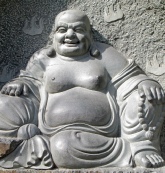



 NEXT
NEXT
 BACK
BACK
 Forum
Forum


Philosophical musings on Quanta & Qualia; Materialism & Spiritualism; Science & Religion; Pragmatism & Idealism, etc.




Chinese Buddha?
Jolly Sensualist
or
Serious Ascetic?
Post 71. January 29, 2019 continued . . . .
Deist versus Buddhist Enlightenment
Is Existence & Experience Enough?
3. Skepticism & Existentialism : “Hume articulates a thoroughgoing, vertiginous, existential kind of doubt.”
When enlightened skeptics concluded that "god is dead", they began to experience the vertigo of existential angst. Their freedom from fear of god, also left their belief systems flailing in mid-
Deists are also free to construct their own destinies, but only within the constraints established by the Creator of the general plot they are embellishing with their personal acting skills.
4. Realism & Idealism : “But here’s Hume’s really great idea: Ultimately, the metaphysical foundations don’t matter. Experience is enough all by itself. What do you lose when you give up God or “reality” or even “I”? The moon is still just as bright; you can still predict that a falling glass will break, and you can still act to catch it; you can still feel compassion for the suffering of others. Science and work and morality remain intact.”
Empirical Scientists may safely ignore metaphysics for practical pursuits. But Philosophers, for theoretical purposes, must take a broader view, in order to avoid the Maya of Materialism. Like the audience entranced by the faux reality of the magician, a Naive Realist sees only what he wants them to see, as he pulls strings behind the curtain. That kind of magic appeals to our willingness to suspend disbelief, in order to enjoy a fictional interlude from prosaic reality. But Deists are aware that the "metaphysical foundations" of reality do matter. Science works better than mysticism because Nature works its magic behind the scenes.
5. Physics & Meta-
Be here now. Live in the moment. Don't worry about spooky spirits. Enlightenment Deists were slow to give-
6. Humeism & Buddhism : “In my shabby room, as I read Buddhist philosophy, I began to notice something that others had noticed before me. Some of the ideas in Buddhist philosophy sounded a lot like what I had read in Hume’s Treatise.”
Some core concepts from a variety of ancient philosophies have certain things in common. But perhaps the most common is the human need for an ultimate reason for being, the be-
Pragmatic realists have no need for the notion of a cosmic Self to embody the answers to all "Why?" Questions. But theoretical idealists like the idea of an eternal executive, with a sign on his desk, saying "the buck stops here!"
End of Post 71


Buddhist Salvation
click here for popup

What do you lose when you give up G*D or Self?
Since they are not physical, you won’t notice their absence at first. But whenever you try to think or speak of meaning or morality, beyond whatever is right in front of you, you’ll be forced to fall back into the old ways of metaphysical thinking.
The old gods were portrayed in literature as dealing directly with their people. But in practice, their power & benevolence had to be taken on faith in second-
Therefore, godless people are no worse-
What difference does a deist G*D make in your life?
For most people, the feeling that someone is in control of the crazy world is comforting. But most of them expect their deity to intervene directly and immediately in the world on their behalf, just as he does in the scriptures. When that does not happen, they rationalize god’s failure to live up to his reputation in arguments such as the Why Bad Things Happen to Good People inspirational books.
https://en.wikipedia.org/wiki/When_Bad_Things_Happen_to_Good_People